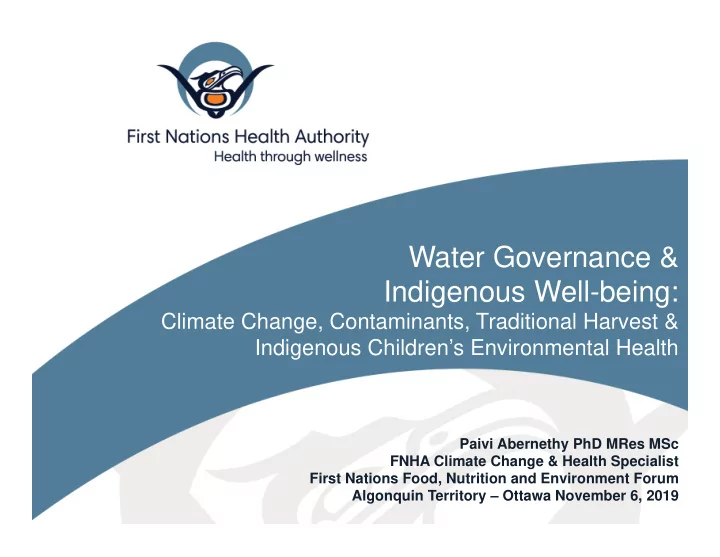

Water Governance & Indigenous Well-being: Climate Change, Contaminants, Traditional Harvest & Indigenous Children’s Environmental Health Paivi Abernethy PhD MRes MSc FNHA Climate Change & Health Specialist First Nations Food, Nutrition and Environment Forum Algonquin Territory – Ottawa November 6, 2019
www.fnha.ca Talking Points � The complex influences of environmental contaminants on Indigenous health � Situating the findings � Concerns � Why does it matter? (FEHNCY) � Indigenous solutions & water governance � Research � Practice � Policy � What are your thoughts on this? 2
www.fnha.ca Water governance Traditional Water harvest pollution DoHAD* All our relations** (Health) ** Colborn et al. (1993). Developmental effects of endocrine-disrupting chemicals in *Developmental Origin of wildlife and humans. Environmental health perspectives , 101 (5), 378-384. Health and Disease
www.fnha.ca Two-Eyed Seeing Integrative Science (in Mi’kmaq: Toqwa’tu’kl Kjijitaqnn ) Two-eyed seeing refers to learning to see from one eye with the strengths of Indigenous ways of knowing and from the other eye the strengths of Western ways of knowing, and using both of these eyes together to use the gifts and insights from both to gain a more fulsome understanding. Bartlett, C., Marshall, M., & Marshall, A. (2012). Two-Eyed Seeing and other lessons learned within a co-learning journey of bringing 4 together indigenous and mainstream knowledges and ways of knowing. Journal of Environmental Studies and Sciences , 2 (4), 331-340.
SITUATING THE FINDINGS 5
www.fnha.ca FNFNES findings � Nutritional quality of food Challenge #1: � Overweight “The consumption of � Food insecurity traditional foods differed � Water quality between communities and � Mercury appears to be related to � Chemical contamination of traditional contamination concerns.” foods not a health concern (as currently (Hlimi et al. 2012) consumed) Good news: The measured toxic exposures in adults mostly below acceptable limits Hlimi et al. (2012). Traditional food consumption behaviour and concern with environmental contaminants among Cree schoolchildren 6 of the Mushkegowuk territory. International Journal of Circumpolar Health , 71 (1), 17344.
www.fnha.ca Challenge #2: Indigenous Determinants of Health Spiritual Health Physical Health Identity Social Networks Water, land & air Food Security Traditional food Empowerment Medicines Livelihoods Community Capacity Mental Health Emotional Health 7 Adapted from Swinomish Indian Tribal Community by Larry Campbell & Jamie Donatuto, 2015 at https://www.niehs.nih.gov/research/supported/translational/peph/webinars/tribal/indigenous_health_indicators_508.pdf
www.fnha.ca Holistic approach to health 8
www.fnha.ca Community Concerns 1. Hayes, T. et al.(2006). Pesticide mixtures, endocrine disruption, and amphibian declines: Are we underestimating the impact?. Environmental Health Perspectives , 114 (Suppl 1), pp.40-50 2. https://www.cbc.ca/news/canada/edmonton/fort-mcmurray-athabasca-river-bitumen-deformed-fish-study-1.5139766 3. https://globalnews.ca/news/3835007/alberta-fish-powerade-wrapper/ 4. http://science.time.com/2010/07/29/canadas-transsexual-fish/ 9 5. https://globalnews.ca/news/5802595/bc-salmon-stocks-plunge/ .
Additional pressures: Indirect climate health outcomes � Spawning/ harvest season � Less fresh water � Increased ocean levels � Acidification � Warmer waters � Toxic blooms/ pathogens � Contaminant release � Temperature � Flooding A tweet by the Food and Agriculture Organization (FAO) of the United Nation, Jan.31, 2017 10 https://twitter.com/FAOclimate/status/826467671625580546
www.fnha.ca Unexpected climate change impacts on health: Historical cumulative effects 11
Why does this matter? (FEHNCY) Developmental Origin of Health and Disease (DOHaD) Exposure to certain environmental influences during critical periods of development and growth may have significant consequences on an individual’s short- and long-term health Barouki et al. (2012). Developmental origins of non-communicable disease: implications for research 12 and public health. Environmental Health , 11 (1), 42.
WATER GOVERNANCE 13
Water Is Sacred 14
www.fnha.ca We can change the situation https://www.cbc.ca/news/canada/kitchener-waterloo/male-fish-intersex-eggs-wastewater-study-grand-river-1.3933033 15
www.fnha.ca Weaving together different ways of knowing for better water governance (Sanderson et al. 2015) � Mutual validation between science and Indigenous knowledge � Indigenous knowledge expanded & enriched the findings beyond the four survey themes: � Wildlife: Climate change has impacted wildlife, resulting in less traditional foods and medicines and the possible future extinction of the Nechakowhite sturgeon. � Health: Human health has been affected in many ways, including through more reliance on store-bought food. Sanderson et al. (2015). Climate change and water at Stellat'en First Nation, British Columbia, Canada: Insights from western science and traditional knowledge. The Canadian Geographer/Le Géographe Canadien , 59 (2), 136-150. 16
Change Is in the Air https://unfccc.int/news/values-of-indigenous-peoples-can-be-a-key-component-of-climate-resilience 17 https://www.bclocalnews.com/news/b-c-wildlife-federation-calls-for-change-in-salmon-management/
www.fnha.ca First Nations & Stewardship � Stewardship is a values-based concept � Values are central to Indigenous knowledge systems, e.g.: � Collective good � Intergenerational responsibility � Being ‘in relationship’ � First Nations governance of (environmental) assets is about stewardship for both present and future generations 18
RESEARCH 19
www.fnha.ca 20
PRACTICE 21
The Cowichan Watershed Board (CWB) � A local governance entity created in 2010, in the Cowichan/Koksilah watersheds, ancestral home of the Quw’utsun First Nation. � Co-chaired by Cowichan Tribes and the Cowichan Valley Regional District (CVRD). To serve as a formal entity to improve collaborative management and decision- making to protect and enhance the health of the whole of the watershed. https://cowichanwatershedboard.ca/ 22
https://cowichanwatershedboard.ca/the-cowichan-watershed-board-2/ 23 https://cowichanwatershedboard.ca/documents-reports/
www.fnha.ca Other Indigenous Solutions https://www.ilinationhood.ca/our-work/guardians/ http://www.climatetelling.info/climate-change--health-adaptation-program.html 24 https://toolkit.climate.gov/case-studies/swinomish-indian-tribal-community-prepares-climate-change-impacts
POLICY 25
www.fnha.ca Indigenous-centred policy frameworks for health � Recognise Indigenous knowledge; � Recognise the inherent right to self- determination; � Use an inclusive and integrative knowledge system; � Employ community-based participatory approaches; and � Use circular and holistic viewpoints “Improving the physical environment and Indigenous participation in environmental decision-making is inherently related to the improvement of health among Indigenous Peoples.” Black, K., & McBean, E. (2016). Increased Indigenous participation in environmental decision-making: A policy analysis for 26 the improvement of Indigenous health. International Indigenous Policy Journal , 7 (4).
www.fnha.ca Questions & Discussion 27 https://toolkit.climate.gov/case-studies/swinomish-indian-tribal-community-prepares-climate-change-impacts
www.fnha.ca Thank you – chi miigwech Paivi Abernethy, PhD MSc MRes Climate Change & Health Specialist Environmental Public Health Services First Nations Health Authority eMail: Paivi.Abernethy@fnha.ca Phone: 250.208.6139 Research Fellow Centre for Global Studies University of Victoria eMail: pabernethy@uvic.ca 28
Recommend
More recommend